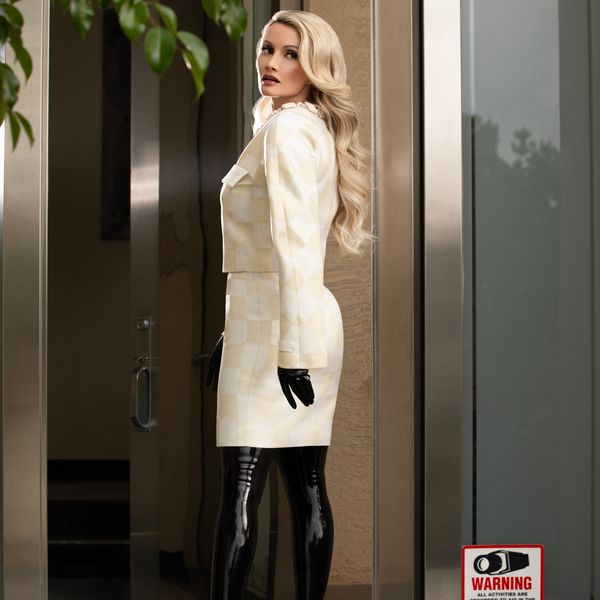
Holly Madison Centers Herself
Story by Shelby Sells / Photography by Walker Bunting / Styling by Danyul Brown / Hair by Amber Duarte / Makeup by Jaime Diaz
Feb 15, 2024
Holly Madison is not your average Girl Next Door. The pop culture icon, best-selling author, and ex-Playboy Centerfold is ever-evolving into new versions of herself. To say she’s had to overcome adversity would be an understatement. From dealing with mental health issues like depression and being late-diagnosed autistic to facing toxicity in her personal relationships, all on a very public level, Madison is adamant that the best way to be successful in life is by staying true to your authentic self.
In her work, Madison represents sex-positive communities our society doesn't normally lend a voice to. Her transparency alone is enough to crack open the hearts of people lucky enough to connect with her. By letting go of what she can’t control, facing her inner critic and giving herself permission to be happy, Madison shows the merits of being a public role model. Through her courageous vulnerability, she is stepping into her power and creating space for others to do the same.
Now, Madison is taking the true crime world by storm, shedding light on the dark side of beauty and fame. After the success of her first series, The Playboy Murders, Madison continues to build her media empire as she debuts her second series Lethally Blonde March 25 on Investigation Discovery. Who knew being glamorous could get so ugly?
Below, PAPER caught up with Madison to discuss prioritizing mental health after being diagnosed with autism, the taboo world of true crime and what she’s manifesting in 2024.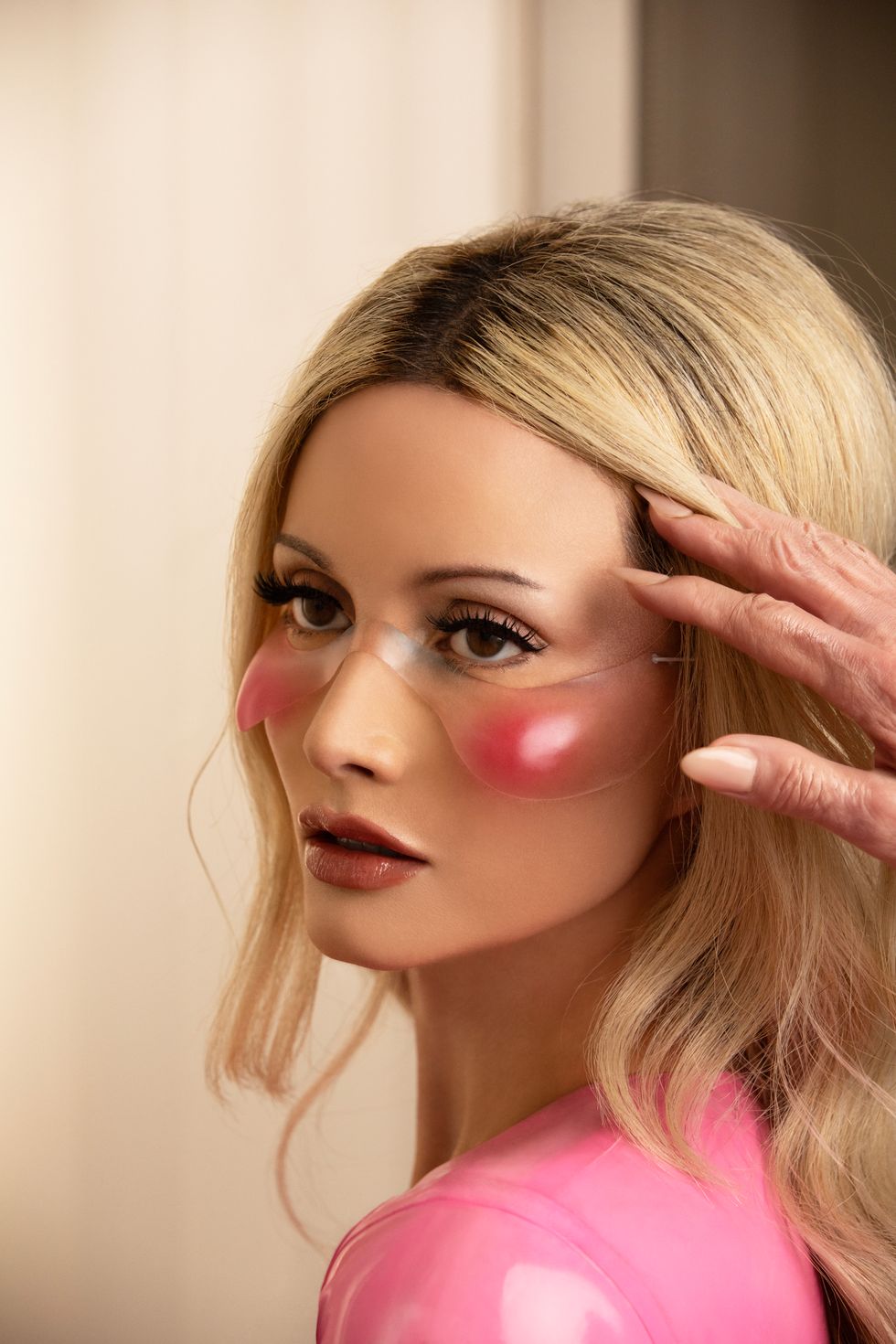
Top and tights: Vex Latex, Skirt: Busted Brand, Shoes: Francesca Bellavita
What can listeners look forward to for season two of your podcast Girls Next Level?
On the next season of Girls Next Level, we're covering season two of Girls Next Door. We're recording our Europe episodes right now, so we have a lot to talk about. We got sued at one point when we were on the shows because something happened, and there was a lot of drama and people getting sent home from the trip. Plus, we have some great guests coming on. We're having so much fun with it, and our listenership is amazing.
I'm curious if it’s ever triggering for you to talk about your time in the Playboy mansion being Hugh Hefner’s girlfriend. Have you found it healing to talk through it on the podcast?
Yeah, in talking about it publicly, whether in my book or on the podcast, there's so much catharsis for me. Just when I think I've become okay with everything, something new will come up in an episode we're watching that will weirdly trigger me. Exploring these things in real-time on the podcast has been really interesting. Whenever I’m feeling triggered, I explore it right then and there. I don't cut away to avoid talking about it. It’s almost like I'm having my weekly therapy session in front of a million people. It's a great platform to have.
It takes a lot of courage to be so vulnerable. What is important about being your authentic self on the podcast?
It has such a positive impact on my life and opens everything up. My path has always been towards authenticity and encouraging others to be authentic, too, because it wasn't like that when I started. When I first moved to LA at 19, I wanted to be in the entertainment industry and fit a mold to be this glamorous, different person. I went full circle and ended up coming back to my authentic self. That's my journey.
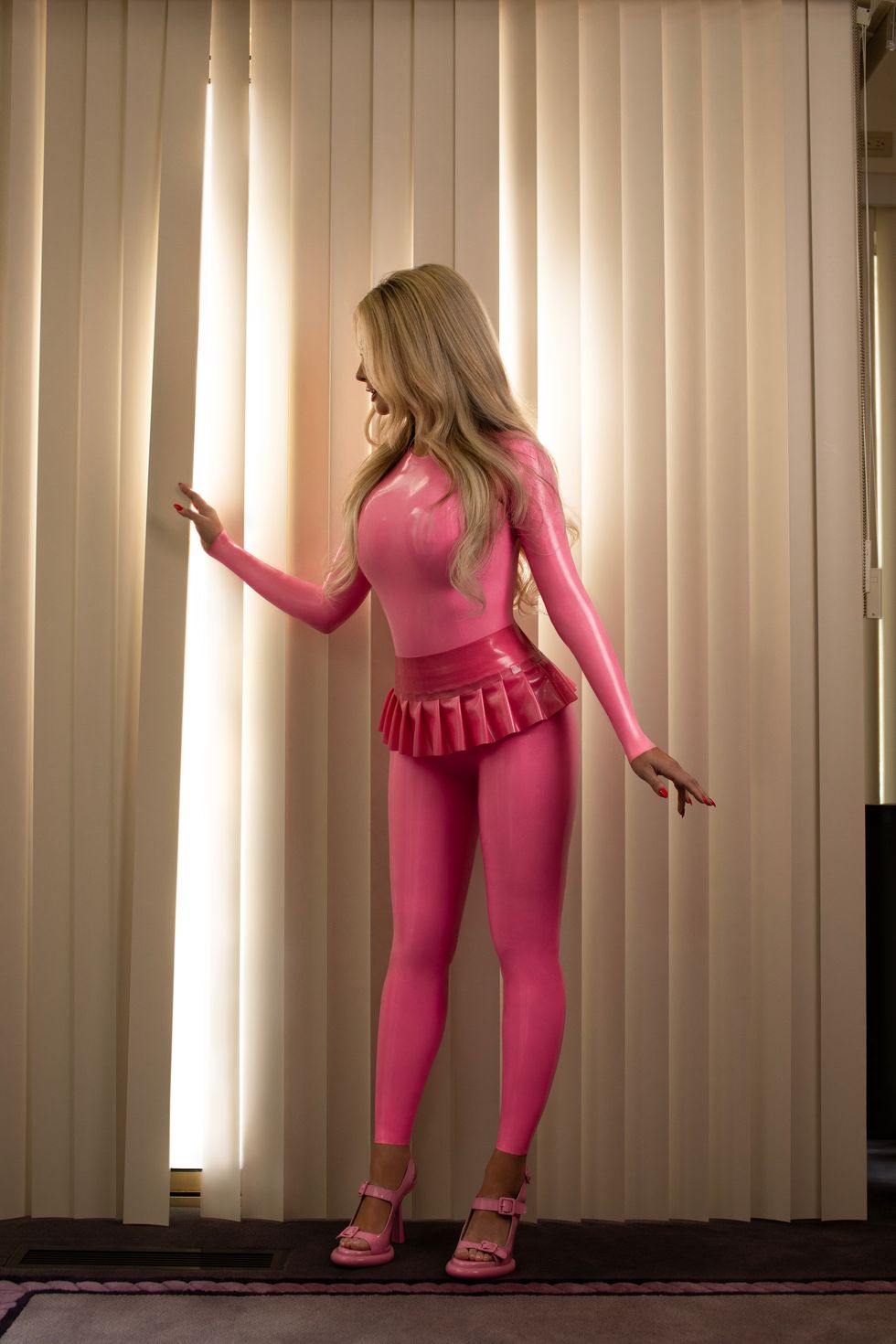
Top and tights: Vex Latex, Skirt: Busted Brand, Shoes: Francesca Bellavita
There's so much power in being yourself. What role does Playboy have in your identity now?
It plays more in my identity regarding how other people perceive me. That's why when I do content like Girls Next Level, where we talk about Girls Next Door, it does so well because people love returning to that time. It's nostalgic for them. It's fun to dive deeper into a different era.
But as far as my day-to-day life, it's not much of a presence. I reserve it for the podcast, mostly. I always call it “going back into a time machine” when discussing the episodes. I don't think about my past too much. It's a different world for me now. My life is very compartmentalized: there's the family part of my life, the boyfriend, the social life, and my work. Girls Next Level is specifically about going back in time, so it kind of stays there. But I enjoy it.
Yeah, I can't imagine if someone consistently brought up who I was from 18 to 25... like, we're digging back into this again?
Yeah, it can really take a toll on your mental health, particularly if those times in your life were challenging for you. And that's one of the reasons it is so healthy for me to have the podcast, so I have a place to dump all those thoughts. If I get weird feedback about something in my past on social media, I can discuss it and leave it in the podcast. It can fuck with your mental health if somebody's constantly bringing up old stuff and the way they perceive it or lies they've heard. It can make you question yourself and drive you up the wall. So I like having that place to sweep all that junk off to.
I’m so grateful you’ve cultivated that safe space and that your listeners get to share it with you. Do you have any other tools or things that you do to keep your mental health in check?
So many things. My whole adult life has been a big mental health journey, dealing with depression and being late-diagnosed autistic. It’s important to have trusted resources available, whether it's therapy, recognizing which of your friends are safe to talk to, keeping up with your regular health, or getting enough sleep. Two of my New Year's resolutions were to schedule sleep like it's work and not get stressed out about things that don't matter. The big incidents that you can't control will always feel like a lightning bolt to the gut, but I'm not going to allow myself to get upset about a hate comment or my schedule going awry. My body can't take it.
A new habit I'm getting into is eliminating negative self-talk that pops up. When things start going well in my life, this little voice pops up out of nowhere like, “Okay, what's going to go wrong? You could lose this.” I am learning to squash that and give myself permission to let happiness be the default. Understandably, people feel paranoid and on guard because that's how our bodies and minds have evolved over the years to evade danger, but it's getting to the point where it ruins lives. We should all start to practice the anticipation of happiness. The other day, I saw a bumper sticker that said, “Anything that can go right will.” That's usually the opposite of how people usually think, but I'm trying to get into more of that mindset.
I call that voice the inner critic. I admire your approach. Switching your perspective is beneficial so we don’t give our power away to things we can't control. It's a tough balance! You have to be gentle with yourself. What did you learn from your time as a playmate?
So much, because it was a decade of my life and my entire world. I feel like one of the major themes I learned were boundaries, consent and that you can embrace your sexuality and appreciate it as an art form and choose how you want to participate without having to feel bad. I've learned a lot about speaking up for myself and defending myself when I make choices that other people might want to squash or think are controversial.
How do you defend yourself in those situations?
I really stand my ground and try to explain where I'm coming from and remind myself that there's like 8 billion souls on this world, and we're all kind of like at different levels of evolution and understanding, and there's always going to be people who just don't understand what you're doing or just want to categorize it in some archaic way, and it's not your job to make everybody understand. You should go on the record and say how you feel so people know, but it's not your job to babysit what everybody thinks of you.
I could not agree more. That's a pretty good pivot to the Playboy Murders and your new show, Lethally Blonde. I'm such a true crime fan, but I had never heard of the “Playboy curse” until I started watching the show. What is the Playboy curse?
The Playboy curse involves the fact that there's a much higher status among Playboy centerfolds for suicides, drug overdose and murder than there is for the average population. Now that's not everybody's experience — so many playmates have had a positive experience — but I think when you're dealing with such a high-stakes environment where there's so much to be gained at such a young age – there's jealousies and a fast lifestyle of people getting addicted to fame and money and maybe getting into industries they're not ready for, that can lead to some crazy stuff.
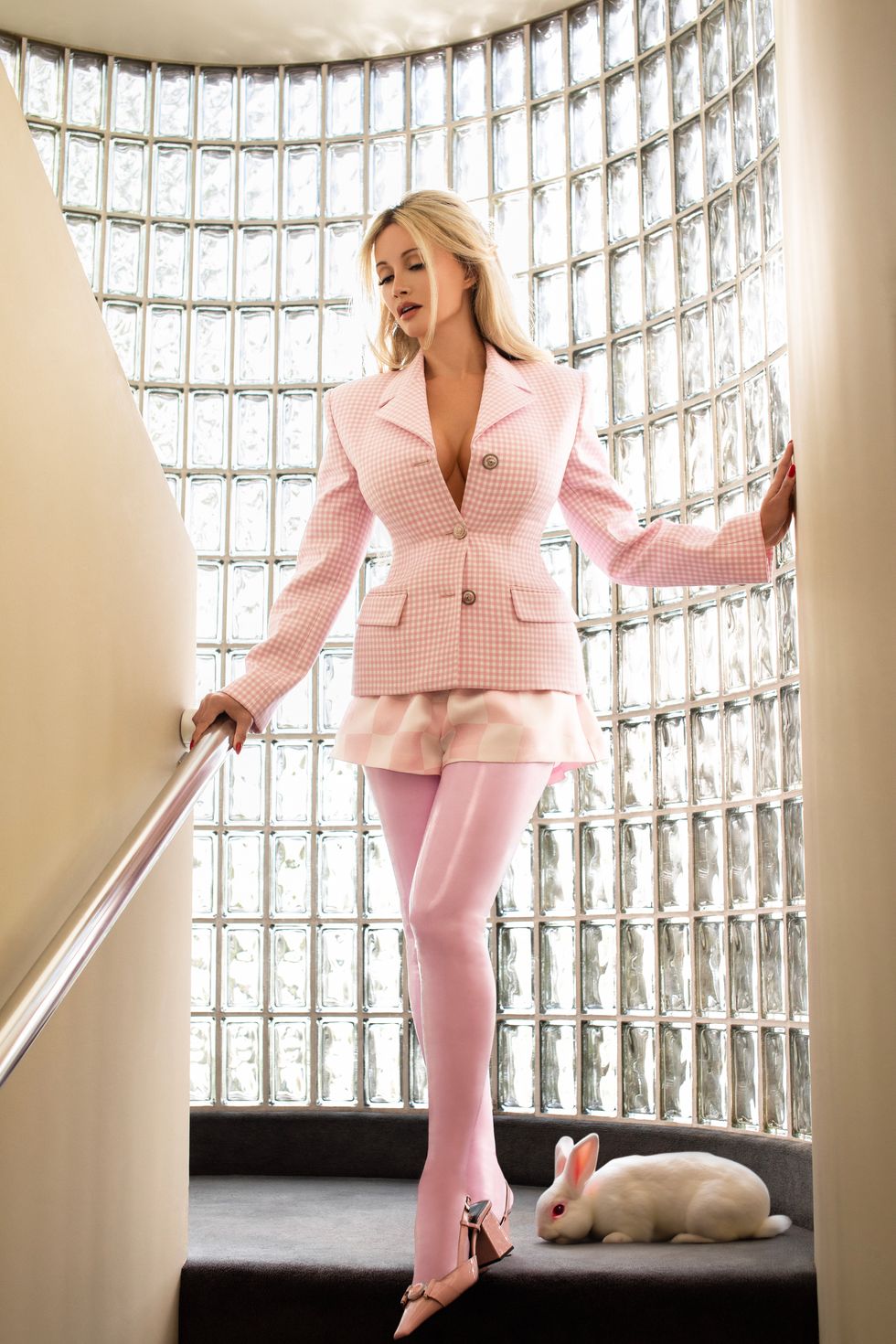
Jacket, skirt and shoes: Versace, Tights: Vex Latex
Totally. It's like getting shoved into the deep end immediately. Why are you drawn to true crime, if at all? What has your experience been like lending your expertise and putting your own spin on the true crime world?
I’ve always been fascinated with true crime, ever since I was little. My favorite show was Unsolved Mysteries. I don't know why, I've just always loved a mystery or a story with a morbid side to it. I've always wanted to explore it, find out the whole truth, as much as possible. I think part of it might be a little cathartic. If we hear these stories and learn from them, maybe we'll feel a little safer when we go out into the world. I'm thrilled to be able to cover true stories that I think should be told, mainly because some are still unsolved. I love talking about the people involved and fleshing out their personalities more, rather than reducing them to just a headline like, “Playboy Bunny this” or “stripper that,” you know what I mean? I love diving into a true story, getting to know more about it and trying to skew the story more from a victim-centric standpoint.
Why do you want to tell the stories of playmates, adult actors, sex workers and OnlyFans performers? What's important about giving those folks a voice?
These stories really appeal to me. Many involve people I could relate to in some way or people who have been in industries similar to the ones I've been in. Those people tend to be marginalized, stereotyped and reduced to their jobs. People don't look at them as whole human beings. I wanted to approach all these stories by portraying more about the victim and the people involved, so people could see a 360-degree view and not just write someone off as just one thing. In any type of category of sex work or anything that's considered the sex industry, people want to write those people off as if they don't matter, and it's not true.
I respect that you are championing them. How else do you think that we can be allies to sex workers?
Listening to people's stories is a great start. There are so many different stories from people who work in those industries who love it and own it – to people who got into it, thinking it would be great, found out it's very much not for them – to people who were forced into it. I love that we're in an age with social media and people sharing their personal journeys. I mean, this is not related to sex work, but even with me, you know, finding out I was on the spectrum, just having so many creators that I see on my [TikTok] For You page who are autistic and sharing their experiences. It's so educational for me and so enlightening. This big story-sharing era makes me feel like I'm not alone.
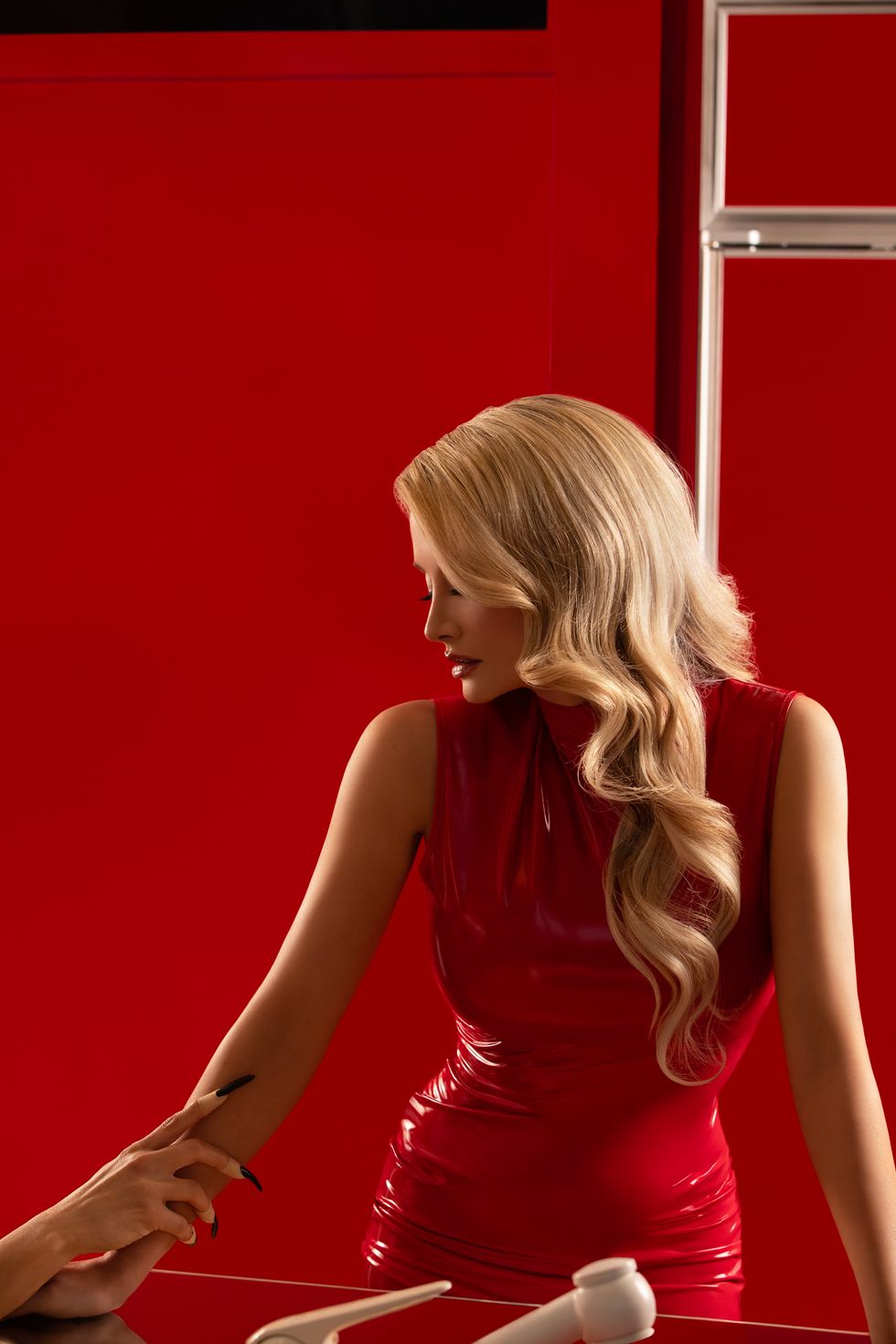
Dress: Mowalola
Vulnerability breeds connection! Speaking of which, I am curious about your journey with autism. What was it like to finally get a diagnosis? How are you living with it day-to-day now?
I always knew there was something about me that was a little different. I didn't quite function socially the same way other people did. I always wrote it off as maybe being introverted or growing up in Alaska in a very isolated place. When I finally got the diagnosis last summer, after a long and strenuous process, it was very much a relief to me. Of course, it's called a spectrum for a reason. Everybody's so different. So I'm not by any means like a spokesperson for everybody who has autism, but I just love being able to say what I'm dealing with finally. I think it's so helpful for me and people interacting with me because maybe now they won’t take it personally or think I'm being stuck up.
It's really cool that you made it a point to get diagnosed and are being so open about it. Thank you. Let's talk about what's coming up next for you. How would you describe yourself? Who is Holly Madison in 2024?
I am a mom. I'm trying to stay healthy and present and do work I enjoy. That sounds so boring, but that's just like the core of it.
What has it been like being a mom? How has it impacted who you are?
I love it. I mean, I'm so lucky. My kids are amazing, well-behaved and healthy. I try to be in the moment with them as much as possible. Every day your patience is tested, your judgment skills are tested, how you react in an emergency is tested and every day it's a new thing. I'm just trying to enjoy it while they’re still little.
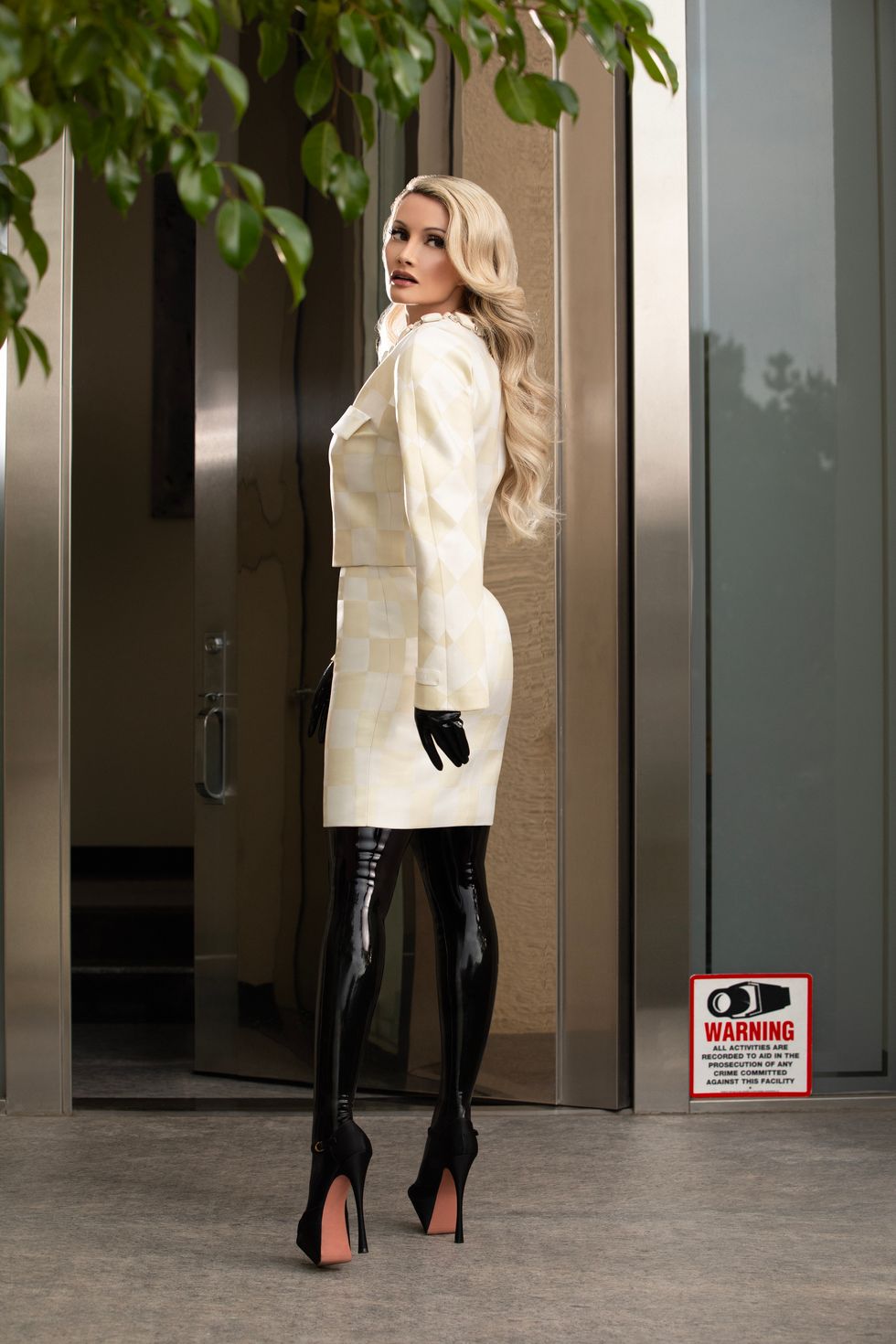
Jacket and skirt: Versace, Tights and gloves: Vex Latex, Shoes: Amina Muaddi
What are you manifesting in 2024, and what are you letting go of? Do you have any personal or creative goals?
I’m manifesting so many things. Last year I finished my vision board, and it's enormous! I look up photos that represent exactly what I want online, and then on Canva I'll make little collages of it, and then I'll print it out and put it on a big poster board. I have it in front of my treadmill and as my phone screensaver. I also made little copies of it for my day planner and desk. I love it so much. I'm shy about saying what they are because then you look dumb if you don't do them, but I have a lot of goals. Any stress I can let go of, I'm doing that.
Do you consider yourself to be a role model? And what does that kind of mean to you?
I've never considered myself a role model, but I've always wanted people to learn from my story – red flags in relationships to look out for and how to make lemonade out of lemons from the decisions I’ve made. I consider myself kind of a work in progress, so I don't know if a role model is what I would call myself. I think it's super healthy to look at people and certain aspects of them that you admire, but you don't have to put people on a pedestal. I'm not big on celebrity worship but on being a fan of admiration.
It seems like you’ve overcome a lot of adversity to become the individual you are today. What are the biggest red flags that we should look out for in relationships?
When people try to get too controlling of you early on, even if they're disguising it as a career opportunity or to help you. The biggest red flag that I can boil it down from being in a couple of toxic relationships is getting love bombed in the beginning. Everybody wants somebody who's complimentary, likes giving you gifts and makes you feel special. But how do you realize it's love bombing and not just a guy being awesome? The giveaway I've noticed is when they're trying to push ahead milestones of the relationship you're not ready for. For example, I met a guy who wanted me to move in with him after only knowing him for a month, and he was very insistent on moving in, even though I knew that was a bad idea. It’s a red flag when people try to push you into a further step in the relationship too early on, no matter how good it might feel in the moment. That can be a warning sign.
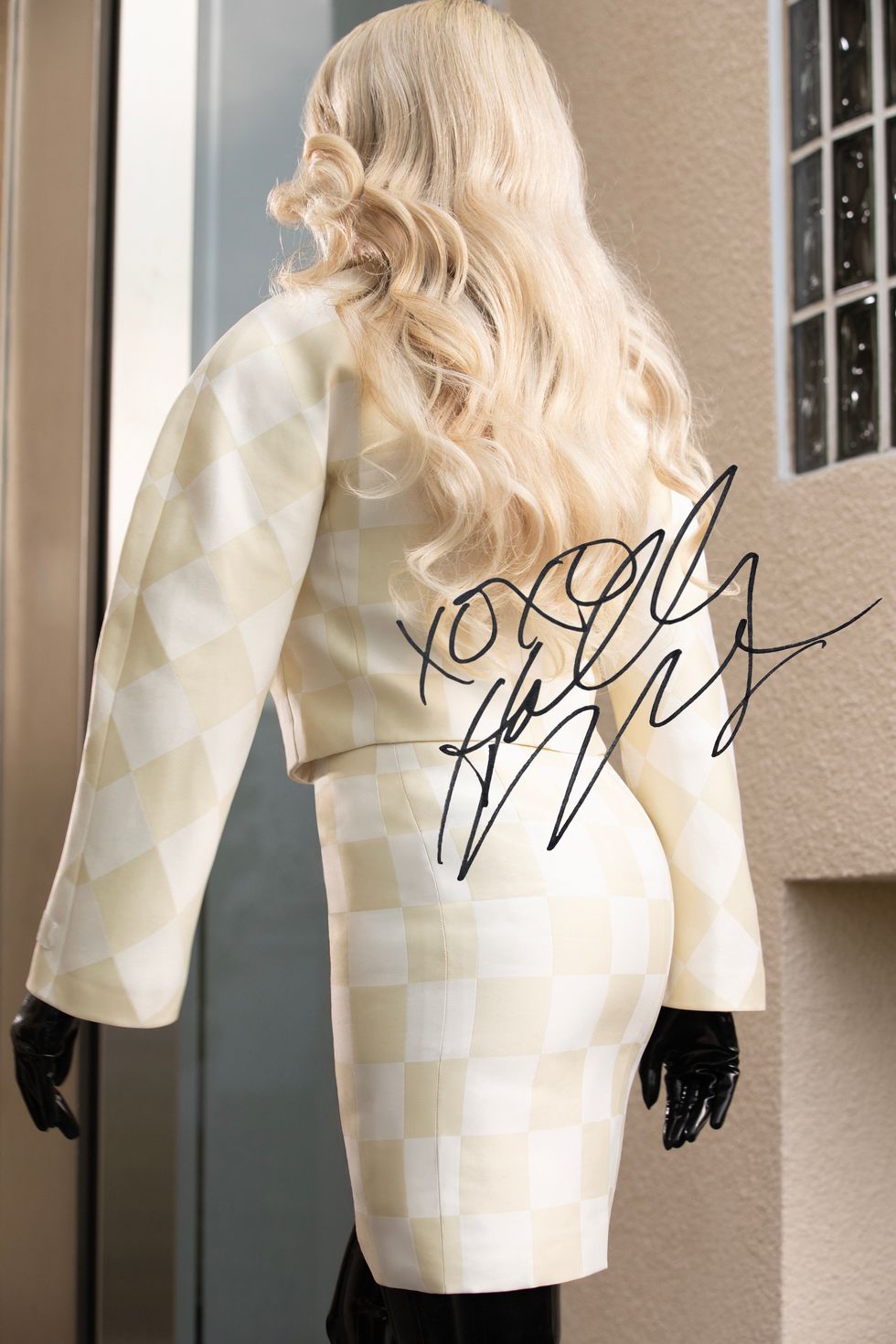
Jacket and skirt: Versace, Tights and gloves: Vex Latex, Shoes: Amina Muaddi
Now on the flip side, what are some green flags? Indicators the relationship is healthy.
Taking your time getting to know somebody. I feel like it takes at least three months of being in a relationship with somebody before their “psycho” starts to come out. Somebody who respects your individuality, gives you space to hang out with your friends, isn't trying to dominate all of your time, isn't making judgments about your past, practices open communication and can participate in reasonable conflict resolution are my favorite green flags.
When you were younger, did you see yourself becoming the icon you are today?
I wanted to be something, but I don't think I really knew what I wanted to be. Back then I said I wanted to be an actress, because I thought that was a way to become a character. I don't know how else to describe it. So I guess I am kind of a character, you know?
I’d say you’re a true character, you know what I mean? It seems like in one way or another you’ve always been yourself. It feels organic. What advice would you give to your younger self now?
I would just tell myself to hang on and that things are going to be better – that I will make something good out of this. I had that little voice in the back of my head anyway, no matter how distraught or hopeless I was in the moment, there was always that voice that kept me hanging on. I think that's really important. Also, take time when making your decisions. Don't make fear-based decisions.
Do you have any other advice for anyone who will be reading this?
My journey has been all about authenticity, being myself and putting myself out there. But that's hard to say, because people always tell you to be yourself like it's the easiest thing ever, but if you don't know yourself, especially when you're younger, you can't do that. So I would say give yourself some grace, because there are going to be times in your life, particularly in your twenties, when you don't know what the fuck you're doing. It's okay to go through phases. It's okay to go on this journey of finding out who you are. Don't let people hate on you or get you down or say you're being fake because you're trying something new. There's going to be a journey before you find out who you are and you need to give yourself grace with that.
Photography: Walker Bunting
Styling: Danyul Brown
Hair: Amber Duarte
Makeup: Jaime Diaz
Photography assistant: Sela Pierce
Styling assistant: Nik Vandalen
Editor-in-chief: Justin Moran
Managing editor: Matt Wille
Editorial producer: Angelina Cantú
Story: Shelby Sells
From Your Site Articles
MORE ON PAPER
ATF Story
Madison Beer, Her Way
Photography by Davis Bates / Story by Alaska Riley
Photography by Davis Bates / Story by Alaska Riley
16 January
Entertainment
Cynthia Erivo in Full Bloom
Photography by David LaChapelle / Story by Joan Summers / Styling by Jason Bolden / Makeup by Joanna Simkim / Nails by Shea Osei
Photography by David LaChapelle / Story by Joan Summers / Styling by Jason Bolden / Makeup by Joanna Simkim / Nails by Shea Osei
01 December
Entertainment
Rami Malek Is Certifiably Unserious
Story by Joan Summers / Photography by Adam Powell
Story by Joan Summers / Photography by Adam Powell
14 November
Music
Janelle Monáe, HalloQueen
Story by Ivan Guzman / Photography by Pol Kurucz/ Styling by Alexandra Mandelkorn/ Hair by Nikki Nelms/ Makeup by Sasha Glasser/ Nails by Juan Alvear/ Set design by Krystall Schott
Story by Ivan Guzman / Photography by Pol Kurucz/ Styling by Alexandra Mandelkorn/ Hair by Nikki Nelms/ Makeup by Sasha Glasser/ Nails by Juan Alvear/ Set design by Krystall Schott
27 October
Music
You Don’t Move Cardi B
Story by Erica Campbell / Photography by Jora Frantzis / Styling by Kollin Carter/ Hair by Tokyo Stylez/ Makeup by Erika LaPearl/ Nails by Coca Nguyen/ Set design by Allegra Peyton
Story by Erica Campbell / Photography by Jora Frantzis / Styling by Kollin Carter/ Hair by Tokyo Stylez/ Makeup by Erika LaPearl/ Nails by Coca Nguyen/ Set design by Allegra Peyton
14 October




